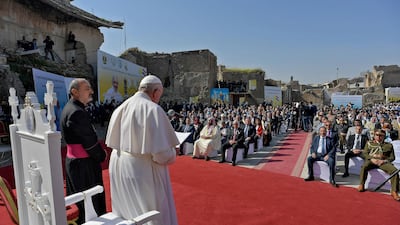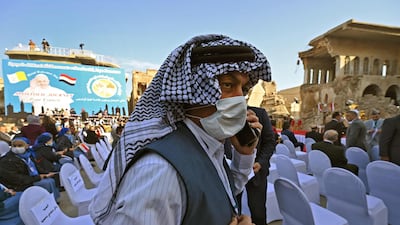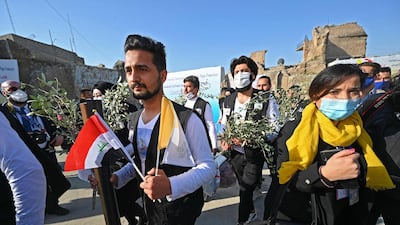Pope Francis' visit on Sunday to the northern city of Mosul, where he prayed for war victims amid the ruins of four churches, has revived bitter memories for Yassir Goyani, recalling the darkest days of ISIS.
The area is located in the heart of Mosul’s Old City known locally as Hosh Al Bieaa, or the Church Square, where four churches representing different denominations stood for centuries, symbolic of Iraq’s once-flourishing Christian community.
When ISIS overran the city from mid-2014 to late 2017, the complex served as the headquarters of the group’s most feared Diwan Al Hisba, or Morality Police, including a jail and court.
The militants, mainly in Afghani-style clothing, used to roam the streets to make sure the population enacted the group’s laws and to punish violators. The force also contained women, to help arrest and punish female offenders.
Some violations included smoking and selling cigarettes, wearing western-style clothing and keeping stores open during prayer time.
Foreign fighters
It was some time in early 2015 when Muslim Mosul resident Mr Goyani went on a high risk journey to help family friends.
His then 17-year-old friend was put in prison, along with his 10-year-old brother when their father, who was an official at the electoral commission, fled an ISIS raid.
"Their mother and sister were afraid to visit them so I did the mission instead and took clothing and food for them," Mr Goyani, 27, told The National.
“I still remember an angry militant with a long beard, I think he was from North Africa —maybe from Tunisia or Algeria from his accent — who kept asking me questions about my friends and their father,” he added.
After entering the complex, he saw a militant lashing a man in his 30s in the church yard for smoking, as an elderly woman begged a militant to see her son, and another militant pushed a man into the jail.
In one corner, books were piled up, among them works written by moderate Muslim clerics and writers.
Windows were blocked up with thick steel plates, while doors were fortified with new latches and locks.
Nearly two weeks later, the two brothers were released.
“Those are bitter memories I don’t want to remember, but hard to erase,” he said.
More than three years after declaring ISIS defeated, large parts of Mosul — mainly the Old City —still lie largely in ruins, due to lack of funding, chronic mismanagement, corruption and political infighting.
































